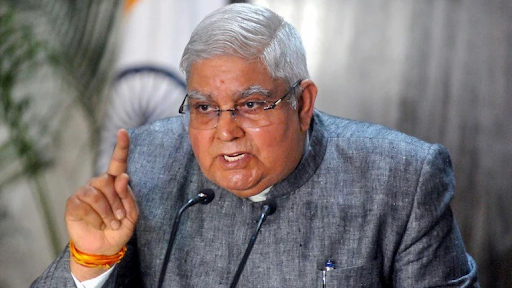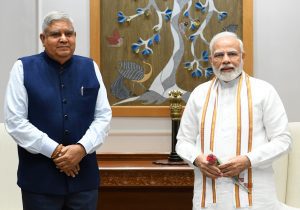
Why BJP picked ‘kisan putra’ Jagdeep Dhankar for Vice-President

The BJP, on Saturday (July 16), announced West Bengal Governor Jagdeep Dhankar as the ruling NDA coalition’s candidate for the August 6 vice presidential polls. Though the Opposition is yet to name its candidate, Dhankar’s victory is guaranteed as the BJP and its allies already enjoy a comfortable majority in the Electoral College (comprising all Members of Parliament) that votes to elect India’s Vice President.
The 71-year-old Dhankar will be the first Jat – an electorally significant community across Rajasthan, Haryana and western UP – to be elected Vice President. Incidentally, the NDA-backed Droupadi Murmu is also tipped to become the first ever tribal woman to be elected President of India later this month. His elevation as VP would also mean that for the first time in Parliament’s history, presiding officers of both Houses will belong to the same state as the Lok Sabha Speaker, Om Birla, also hails from Dhankar’s native state of Rajasthan.

The BJP’s choice of Dhankar as its candidate, once again, shows Prime Minister Narendra Modi’s penchant for springing a surprise. Over the past fortnight, a litany of names had been doing the rounds in Delhi’s power corridors as probable candidates that the BJP leadership was supposedly weighing in on. Key among these had been former Union minister Mukhtar Abbas Naqvi, who was denied a BJP ticket in the recent Rajya Sabha polls, incumbent governors Arif Mohammed Khan, Thawarchand Gehlot and Anandiben Patel, former Punjab chief minister Amarinder Singh and even Union minister Rajnath Singh.
Dark horse
Though BJP insiders had maintained that Modi would ultimately pick a dark horse as the NDA’s choice, Dhankar’s name had not figured even in speculations. Soon after BJP president JP Nadda announced Dhankar’s candidature, a party veteran told The Federal, “there can be a lot of post facto analyses of how he (Dhankar) is eminently suitable for the job or why our leadership picked him, but frankly, a majority of our colleagues and also our allies are as surprised with the choice as anyone else… this is Modiji’s style – no one except him and Amit Shah know who the party will back for what position.”
Also read: Adhere to rule of law and constitutional prescriptions: Dhankar to WB govt
There are ample reasons to explain why Dhankar’s pick comes as a surprise. Unlike a majority, if not all, of the 13 vice presidents that India has had until now, Dhankar’s career – both as a professional lawyer and a career politician – has neither been remarkable nor consistent, even if Nadda and his colleagues in the BJP now canvass the contrary. He is neither a public intellectual, nor a veteran lawmaker and his political affiliations as well as ideological convictions have, at best, been rather elastic.
In fact, before his surprise appointment as Bengal Governor in July 2019, Dhankar had been in political oblivion for over two decades. Technically, Dhankar can boast of a political career that has spanned nearly 35 years but he spent a better part of this period – nearly 21 years – struggling to stay politically relevant.
A first-generation lawyer and politician born in an agrarian household in Rajasthan’s Jhunjhunu district, Dhankar had started out in politics in the mid-1980s as a protégé of Devi Lal, one of the tallest Jat community leaders of his time who served as India’s deputy Prime Minister between December 1989 and June 1991.
After earning early success as a lawyer in his native state, where he was also elected as the youngest president of the Rajasthan Bar Association back in 1987 at the age of 36, Dhankar was handpicked by Lal as the Janata Dal’s candidate from Jhunjhunu in the 1989 general elections and won his first and last Lok Sabha contest. Later, with Lal’s blessings, Dhankar also got inducted in the short-lived minority government of Prime Minister Chandra Shekhar as junior minister for parliamentary affairs. By 1993, Dhankar had quit the Janata Dal to join the Congress and in the same year got elected as the party’s MLA from the Kishangarh constituency in Ajmer.
Also read: Mamata replaces governor as chancellor of state univs; Unconstitutional, says Dhankar
After his tenure as an MLA ended in 1998, Dhankar’s political career too came to a grinding halt. A decade later, he switched to the BJP but from 1998 up till the time he was finally appointed Bengal governor, Dhankar was sought out by colleagues and journalists more for light-hearted banter than for any substantially political or electoral assignment – or even advice.
Face-offs with Mamata
However, in the past three years that he spent as Bengal governor, Dhankar seems to have made up for all the political machinations and stratagems that he, perhaps, had lost out on in the two decades prior to his gubernatorial stint. His frequent face-offs with Bengal chief minister Mamata Banerjee and other members of the Trinamool Congress kept him constantly in news. Dhankar clearly didn’t mind the publicity these repeated altercations brought him – some may argue, he actually craved for it – nor did he seem bothered about being painted by his critics as a brazenly partisan governor acting not to uphold his constitutional obligations but to please the BJP leadership that had revived his dead political career.
It is not surprising that Dhankar’s critics see his vice presidential candidature as a ‘reward’ by Modi for creating administrative roadblocks for the Mamata Banerjee-led Bengal government. However, there are also other reasons that the Modi-Shah duo would have factored in before zeroing in on Dhankar. Nadda’s brief statement to the media on Saturday night recounting the supposedly valuable virtues of ‘Candidate Dhankar’ gave a clear sign of the electoral calculations that would have gone into the BJP’s endorsement of the Bengal governor for Vice President.
Kisan Putra Jagdeep Dhankhar Ji is known for his humility. He brings with him an illustrious legal, legislative and gubernatorial career. He has always worked for the well-being of farmers, youth, women and the marginalised. Glad that he will be our VP candidate. @jdhankhar1 pic.twitter.com/TJ0d05gAa8
— Narendra Modi (@narendramodi) July 16, 2022
The BJP president repeatedly hailed Dhankar as ‘kisan putra’ (son of a farmer) – an appellation that was promptly replicated by all BJP leaders in their tweets congratulating the 71-year-old for his candidature. It is obvious that by highlighting Dhankar’s ‘kisan putra’ credentials, the BJP wants to revive and intensify its outreach to the agrarian community – a sizeable chunk of which has been peeved with the Modi government for reasons ranging from the Centre’s farm laws misadventure to its failed promises of doubling farmers’ income and working towards a peasantry free from the burden of ever-increasing debts.
Reaching out to Jats
Dhankar’s caste identity of a Jat too is significant. The community that had firmly stood behind the BJP since 2014 has seen some division in its affiliation to the party in the aftermath of the anti-farm laws agitation. Though the Jats of western UP did vote in substantial numbers for the BJP in the Assembly polls held in the state earlier this year, several prominent Jat lawmakers of the party had lost their elections to candidates put up by the Akhilesh Yadav’s Samajwadi Party (SP) and its ally, Jat leader Jayant Chaudhary’s Rashtriya Lok Dal (RLD).
Also read: West Bengal governor escalates spat with Mamata government
End of next year, Assembly polls are due in Dhankar’s home state of Rajasthan where Jats are a formidable vote bank. For the past two decades, the BJP has relied on former CM Vasundhara Raje’s clout among the Jats (she was married into a Jat family and often calls herself the community’s bahu in her public meetings) to win in areas where the community has a sizeable presence. However, Raje’s equations with the Modi-Shah duo and her party colleagues in Rajasthan have been frosty and there has lately been talk of the BJP trying to find ways to sideline her.
Party leaders say though Modi would want to clip Raje’s wings, he is also acutely aware that doing so without first initiating a parallel outreach to the state’s Jat community would be electorally detrimental to the BJP’s interests. As such, Dhankar’s appointment is also being viewed as one of the ways in which the BJP wants to reach out to the Jats.
Besides, Jats are also part of the overarching Other Backward Class (OBC) block in most states and the BJP has been assiduously trying to tighten its grip on this vote bank. With a tribal woman as President and an OBC as Vice President, the BJP would clearly want to signal its symbolic commitment to the social and political empowerment of these communities.
As Vice President, Dhankar will also be the ex-officio chairperson of the Rajya Sabha and have a final say in various matters regarding the way Parliament’s Upper House functions. His elevation comes at a time when the Opposition has repeatedly cried foul against presiding officers of both Houses of Parliament acting in a partial manner to suit the BJP and muzzle its rivals. It’s an accusation that Dhankar has seen hurled at himself numerous times over the past three years of his stint as Bengal governor, yet done little to shake off such perception. This for the ruling dispensation may well be the biggest qualification for the job it wants Dhankar to take up.
Shri Jagdeep Dhankhar Ji has excellent knowledge of our Constitution. He is also well-versed with legislative affairs. I am sure that he will be an outstanding Chair in the Rajya Sabha & guide the proceedings of the House with the aim of furthering national progress. @jdhankhar1 pic.twitter.com/Ibfsp1fgDt
— Narendra Modi (@narendramodi) July 16, 2022


